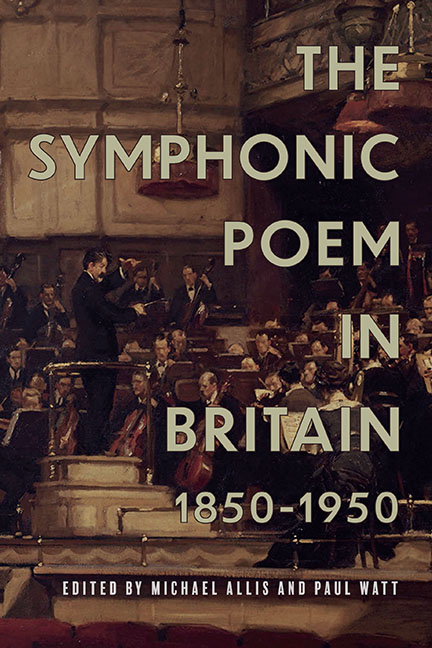Introduction: The Symphonic Poem in Britain
Published online by Cambridge University Press: 23 October 2020
Summary
COMMENTING upon the premières of two British symphonic poems (Percy Pitt's Le Sang des Crépuscules and Granville Bantock's Thalaba the Destroyer) at the 1900 London Musical Festival, Edward Baughan of the Musical Standard wrote:
Mr. Pitt's illustration of M. Guerin's poem is simply a musical interpretation of the composer's impression after reading the whole poem. There is no attempt at descriptive music, beyond that the harmonic texture of the music does attempt to suggest the atmosphere of the poem. But ‘Le Sang des Crépuscules’ is essentially subjective music. Mr. Granville Bantock works in a different direction. The composer himself has informed the world that ‘… Prominent ideas and dramatic episodes are associated with the themes, and there is hardly a phrase or modulation without its special significance tending to the elucidation of the subject.’ And that, I humbly submit, is precisely what a symphonic-poem should not be.
The fact that Baughan devoted the majority of his column to these two works suggests that the British symphonic poem at the turn of the twentieth century was of interest to both the critic and his readers. However, elsewhere Baughan was also keen to explore issues such as the status and influence of foreign models for the genre (bemoaning how ‘scarcely a composition by a young composer is produced but we find he has gone astray into the Berliozian bog of realism’) and the suitability of subject matter; he dismissed the morbidity and ‘diseased idealism’ of Richard Strauss's Tod und Verklärung and Delius's La ronde se déroule, for example. As the quotation above demonstrates, there was also the vexed question of what a symphonic poem ought to be in the first place – all part of a rich debate surrounding the symphonic poem in Britain and the contexts (aesthetic, structural, historical, stylistic) within which it might be understood.
The aims of this book reflect these interconnected ideas. Firstly, the volume aims to raise the status of the symphonic poem generally and its British manifestations in the late nineteenth and early twentieth century specifically. In this regard it provides a much needed balance to the detailed studies of other genres in British music of this period, including song, symphony, opera and the piano sonata.
- Type
- Chapter
- Information
- The Symphonic Poem in Britain, 1850–1950 , pp. 1 - 12Publisher: Boydell & BrewerPrint publication year: 2020



